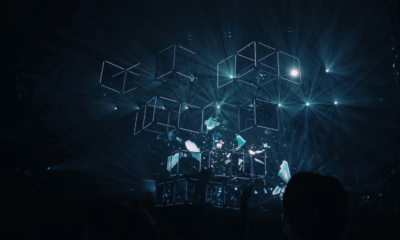Science
Exploring the Complex Nature of Space-Time in Modern Physics

Understanding the concept of space-time is crucial to comprehending modern physics. Central to Albert Einstein’s theory of relativity, space-time is often depicted as a four-dimensional structure that combines the dimensions of space and time into a single framework. This interplay significantly influences how scientists interpret fundamental questions regarding existence, reality, and the nature of time itself.
The portrayal of space-time varies widely in scientific discourse. Some interpretations describe it as a static “block universe,” where all events—past, present, and future—are fixed and unchangeable. In contrast, others view space-time as a dynamic entity that bends and curves under the influence of gravity. Such discussions raise essential questions about the essence of space-time: Is it a concrete structure, a mere abstraction, or something entirely different?
Philosophical Implications of Space-Time
The inquiry into the nature of space-time extends beyond the realm of physics. It influences how we envision concepts such as time travel and the multiverse. These ideas are intricately tied to the philosophical framework known as eternalism, which posits that all moments in time exist simultaneously in a four-dimensional structure. In this view, time does not flow; rather, every event in the universe is equally real.
This perspective challenges our traditional understanding of existence. For instance, consider the difference between an elephant that physically exists and a fleeting image of an elephant that appears momentarily. The former embodies a tangible presence, while the latter merely occurs without enduring existence. This distinction presents a dilemma when applied to space-time: does it exist in the same way the elephant does, or is it simply a descriptive framework for understanding events?
The term “timeless,” often associated with eternalism, complicates this discussion. If time is an illusion and the universe’s history is fixed within space-time, one must wrestle with the implications of such a perspective. Does this mean space-time exists without the passage of time, or do we need to rethink our conceptual framework?
Challenges in Defining Space-Time
The challenge in discussing space-time lies in the ambiguity of language used to describe it. Terms like “exist” and “timeless” acquire new meanings within scientific contexts, often leading to confusion. Ludwig Wittgenstein, the Austrian-British philosopher, suggested that philosophical problems often arise when language is misapplied. In the case of space-time, the common vernacular fails to capture the complexity of its existence, leading to a conflation of concepts.
As physicists grapple with these philosophical questions, they encounter a fundamental issue: if all events in the block universe exist simultaneously, what does it mean for the block itself to exist? This inquiry could suggest the necessity of a five-dimensional framework, introducing additional complexities. Such a model would represent space-time in a manner analogous to how we perceive three-dimensional objects, yet it challenges the established four-dimensional descriptions of space-time.
The implications of this confusion extend beyond theoretical discussions and influence popular culture. Films like The Terminator present a universe where events are fixed and immutable, while others, such as Avengers: Endgame, depict time travel as a mechanism to alter past events. Both interpretations presume a static timeline that can be navigated, yet they overlook the deeper philosophical questions about the nature of existence.
The mathematical integrity of Einstein’s theory remains intact. His equations continue to yield accurate predictions and empirical validation. However, the way these equations are interpreted shapes our understanding of reality and informs ongoing discussions about reconciling general relativity with quantum theory.
Defining space-time encompasses more than a scientific endeavor; it influences our perception of the universe and our place within it. As scientists and philosophers continue to explore these concepts, the dialogue surrounding space-time will play a pivotal role in shaping future advancements in physics.
-

 Science1 week ago
Science1 week agoMicrosoft Confirms U.S. Law Overrules Canadian Data Sovereignty
-

 Technology1 week ago
Technology1 week agoGoogle Pixel 10 Pro Fold Specs Unveiled Ahead of Launch
-

 Technology1 week ago
Technology1 week agoWorld of Warcraft Players Buzz Over 19-Quest Bee Challenge
-

 Health6 days ago
Health6 days agoRideau LRT Station Closed Following Fatal Cardiac Incident
-

 Science6 days ago
Science6 days agoChina’s Wukong Spacesuit Sets New Standard for AI in Space
-

 Technology6 days ago
Technology6 days agoDragon Ball: Sparking! Zero Launching on Switch and Switch 2 This November
-

 Science1 week ago
Science1 week agoXi Labs Innovates with New AI Operating System Set for 2025 Launch
-

 Lifestyle6 days ago
Lifestyle6 days agoVancouver’s Mini Mini Market Showcases Young Creatives
-

 Technology1 week ago
Technology1 week agoNew IDR01 Smart Ring Offers Advanced Sports Tracking for $169
-

 Technology1 week ago
Technology1 week agoHumanoid Robots Compete in Hilarious Debut Games in Beijing
-

 Science1 week ago
Science1 week agoInfrastructure Overhaul Drives AI Integration at JPMorgan Chase
-

 Top Stories1 week ago
Top Stories1 week agoSurrey Ends Horse Racing at Fraser Downs for Major Redevelopment
-

 Business6 days ago
Business6 days agoCanadian Stock Index Rises Slightly Amid Mixed U.S. Markets
-

 Health6 days ago
Health6 days agoB.C. Review Urges Changes in Rare-Disease Drug Funding System
-

 Technology1 week ago
Technology1 week agoGlobal Launch of Ragnarok M: Classic Set for September 3, 2025
-

 Technology1 week ago
Technology1 week agoFuture Entertainment Launches DDoD with Gameplay Trailer Showcase
-

 Science1 week ago
Science1 week agoNew Precision Approach to Treating Depression Tailors Care to Patients
-

 Education6 days ago
Education6 days agoParents Demand a Voice in Winnipeg’s Curriculum Changes
-

 Business6 days ago
Business6 days agoAir Canada and Flight Attendants Resume Negotiations Amid Ongoing Strike
-

 Technology1 week ago
Technology1 week agoInnovative 140W GaN Travel Adapter Combines Power and Convenience
-

 Health6 days ago
Health6 days agoRideau LRT Station Closed Following Fatal Cardiac Arrest Incident
-

 Business1 week ago
Business1 week agoNew Estimates Reveal ChatGPT-5 Energy Use Could Soar
-

 Business1 week ago
Business1 week agoUkraine Strikes Lukoil Refinery, Halting Operations Amid Conflict
-

 Health1 week ago
Health1 week agoGiant Boba and Unique Treats Take Center Stage at Ottawa’s Newest Bubble Tea Shop










